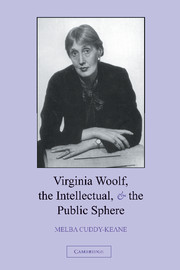Postscript: intellectual work today
Published online by Cambridge University Press: 22 September 2009
Summary
The success of Woolf's criticism in her time can be measured by the wide-ranging press coverage of The Common Readers, their successful sales records, and the appreciative letters Woolf received from unknown readers. Nevertheless, as English became a professional subject of university study in the West, the general literate reader was gradually replaced by the “student,” and the academic study of English became the dominant mode of informed literary exchange. By the end of Woolf's lifetime, the approaches of critics like Lubbock, Richards, and Eliot were regarded more highly than Woolf's, as authority, objectivity, and a codifiable methodology were invoked to defend the study of English against the prestige increasingly accorded to science and technology. By mid-century, the New Critics and Formalists assumed what was to be an increasingly important role by countering the previous excesses of subjective impressionism with the rigors of close textual readings and by providing a vocabulary and methodology for the analysis of form. Woolf's essays were thus understandably overshadowed by the impersonal, objective analysis that came to dominate English studies in the West, but which was itself overshadowed in turn by the heavily theoretical writings that arose in resistance to the truth-oriented assumptions of New Critical and Formalist modes. Nevertheless, in the endless dynamics of change, the new theory, although it usefully introduced the concepts of provisionality and constructivism into our interpretative models, was becoming, by the end of the century, subject in turn to its own excess.
- Type
- Chapter
- Information
- Virginia Woolf, the Intellectual, and the Public Sphere , pp. 194 - 196Publisher: Cambridge University PressPrint publication year: 2003



